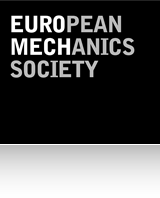524 – Multibody system modelling, control and simulation for engineering design
Date:
27 February 2012 – 1 March 2012
Location:
Enschede, The Netherlands
Website:
Chairperson:
Prof. Ben Jonker
University of Twente, Faculty CTW
Mechanical Automation
P.O. Box 217 – Building Horst
7500 AE Enschede,
The Netherlands
email : J.B.Jonker@utwente.nl
Co-chairperson
Prof. Werner Schiehle
Institute of Engineering and Computational Mechanics,
University of Stuttgart
Germany
The colloquium addresses the method of multibody system dynamics for advanced technologies and engineering design for which a numerical efficient approach is crucial. In particular a designer can take significant advantage of model based dynamical analysis. The numerical methods applied for multibody systems dynamics have proved to offer solutions for the analysis of systems with interconnected rigid and flexible bodies subject to various loads and undergoing complex motion. While high accuracy can be obtained with extended models including a large number of degrees of freedom, there is a clear need for numerically efficient techniques that still offer an adequate level of accuracy. E.g. the optimisation of the design parameters usually implies that systems with varying parameters have to be analysed in a short time. The modelling techniques applied for this purpose should provide fast simulations of the relevant system’s behaviour which exhibits often non-linearities. Depending on the application area, multibody dynamic analysis has to be coupled to other relevant physical domains to address e.g. electrical and thermal effects or fluid-structure interaction. Mechatronic systems are usually modelled as multibody systems subject to sophisticated non-linear control. Model order reduction techniques are required for control design and to increase the computational speed.
The goal of this colloquium is to provide a platform for discussions on the relation between multibody systems analysis tools and the requirements needed for design. Topics are:
- Numerically efficient multibody system dynamics techniques;
- Design principles for exact constraint;
- Underconstraint and overconstraint mechanical systems;
- Underactuated and overactuated compliant mechanisms;
- Flexible multibody dynamics and reduced order modelling;
- Mechatronic design and control systems;
- Parameter optimisation and manufacturing tolerances;
- Simulation for engineering design;
- Applications to engineering systems.
